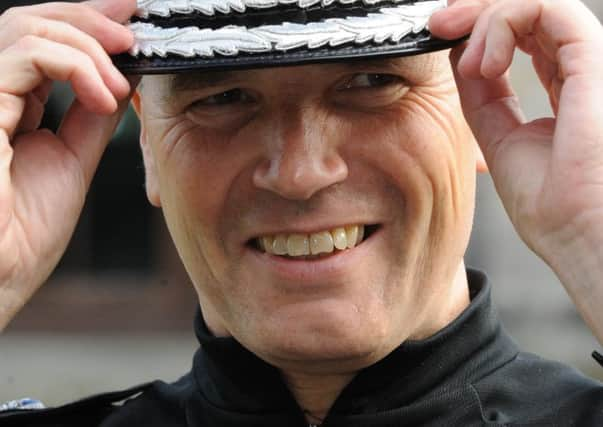Comment: Another twist in Stephen House’s tenure


Yesterday’s revelation that the Police Scotland Chief Constable is considering stopping non-statutory stop and search was the latest twist in a career that has divided opinion.
His stop and search policy was just one of several contentious issues that has dogged the him in recent years.
Advertisement
Hide AdAdvertisement
Hide AdAs the police officer charged with leading the country’s new single Police Scotland, Sir Stephen has had to deal with the challenge of merging the different cultures and traditions of eight distinct forces.
Previously the chief constable of Strathclyde Police, Sir Stephen won acclaim for police work cracking down on gangs and for presiding over dramatic decreases in violence.
But since his appointment and the single force’s establishment in 2013, Sir Stephen’s approach has raised eyebrows.
Police Scotland was accused of imposing a one-size-fits-all approach without proper public discussion and scrutiny.
Concerns about a lack of police accountability and the imposition of a new style of policing emerged almost as soon as the single force was created.
In June 2013, about 150 police officers raided saunas across Edinburgh and, in a second wave during August, completed the sweep of all 13. Five people were charged with brothel-keeping and living off immoral earnings, and others faced drugs charges.
FOLLOW US
SCOTSMAN TABLET AND MOBILE APPS
Support agencies, MSPs and councillors were critical of the move, which many saw as an illustration of a “Glasgow-centric” approach of the new service, which ignored the route Edinburgh had taken to deal with its vice problem.
Critics of the sauna raids claimed they endangered trust between officers and women in the trade.
Advertisement
Hide AdAdvertisement
Hide AdArguably the most controversial move made by Police Scotland came when Sir Stephen began allowing officers with visible firearms to attend routine incidents.
A row erupted when it came to light that around 200 armed officers were deployed on routine duties. Their existence was revealed when armed police were spotted with holstered pistols while attending a routine disturbance in a fast food restaurant in Inverness.
Anger grew when it emerged former justice secretary Kenny MacAskill had kept quiet about the firearms standing authority directive for more than a year.
After an outcry, the standing authority was rescinded in October and armed police now only attend life-threatening incidents or those involving firearms.
Another cause for concern has been the rising number of people who have been “stopped and searched” by police officers. The Lib Dems, in particular, have expressed their unhappiness at their frequency.
Last June, Assistant Chief Constable Wayne Mawson told a Holyrood committee that consensual searches on children under the age of 12 were “indefensible” and would be scrapped.
However, it emerged earlier this week that 356 youngsters in that age group had been stopped and searched since he made the pledge.
One hundred and fifty-nine children under the age of nine have been searched by Police Scotland over the past year compared to nine by the Metropolitan force in London, which has more people and higher crime.